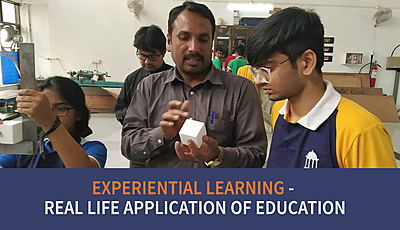Experiential Learning – Real Life Application of Education

This statement by the great statesman rings true in all times, and in modern terms refers to the ‘experiential learning’ methodology. Experiential learning collectively means the specific ways of learning by getting involved in activities beyond just imbibing theoretical concepts. It involves things like the play way method of teaching and arts and crafts for younger children; field trips, experimentation, research, lab work, group presentations, competitions, and innovation and commercialization of those innovations for older students.
Experiential learning includes primary research, assignments and activities based on real-life situations. The primary research engages the students with reflective problem solving and opens multiple potential avenues of inquiry. This helps enhance their critical thought patterns, logical deductions, and the ability to seek varied perspectives to approach a situation. Some of the best residential schools in Mumbai, Pune, and other parts of India thus increasingly employ on-campus experiential learning activities as an integral part of the pedagogy.
At the primary level, experiential learning could involve things like clay modelling, art and craft activities, and visiting a zoo or an aquarium to learn about animals and sea life. A visit to a pottery workshop, or just walking in the park to see various trees and plants.
Experiential learning for middle years includes, among others, things like making a gyroscope, growing mould on wet bread to learn about fungus, germinating seeds to see how plants grow, working with prisms to understand different colours of the rainbow or visit to planetariums, science parks, etc.
In the high school, experiential learning takes on a more advanced form through lab work, research papers, visits to geological sites, rocket launching facilities, national research laboratories, and internationally to places like NASA research facility, participation in subject-based, sports, art or other competitions, innovating products and applications etc. Good schools in Pune, the education capital of India, are well known to employ such learning techniques in their curriculum.
MIT Gurukul, one of the most renowned and among the best schools in Pune, is at the forefront of such educational ethos. We have found through experience that students who are exposed to experiential learning are able to tackle their subjects better, are more creative, become better at teamwork, leadership potential and communication skills, develop research acumen, and thus are more confident in their scholastic and other tasks. They also have holistic personality development through co-curricular indulgences. The teachers also play a definitive role in such experiential learning through encouraging facilitated and guided practice, reflection, and evaluation amongst students.
In a nutshell, experiential learning through open-ended discussions and questioning guidance, experimentation and immersion in tasks, allows students to develop ideas, test them, and enjoy successes. It also facilitates learning and growing from failures, engaging in continuous intellectual development, and finding ways to overcome challenges. These life skills are very important in goal setting and goal achieving at every stage in life.
MIT Gurukul invites and encourages all current and prospective parents to attend our open house sessions and see first-hand our experiential learning facilities, meet the teachers and get their questions and queries answered to satisfaction. To see our schedule for upcoming events and open houses, please visit https://www.mitgurukul.com
“Tell me and I forget, teach me and I may remember, involve me and I learn.”
-Benjamin Franklin


